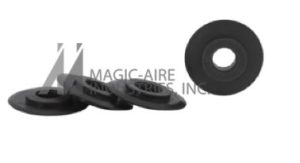
What is a Tube Cutter?
The best way to cut tubes at various lengths is by using a tube cutter. This is a handheld tool with rotating cutting blades that can cut a long piece of tube into two or more parts. A tube cutter is commonly used for creating custom piping systems in both residential and commercial buildings, for industrial plumbing or processing lines in fluid transfer systems, for waste water treatment, for gas handling, and for heating and cooling systems. Its parts include a curved jaw housing, a blade, and a handle which allows you to hold the tube in the cutter’s jaws and rotate the entire cutter around it.
Proper Care and Maintenance for Tube Cutters
Select the Correct Cutter
In order to make a clean cut, you should choose the appropriate tube cutter to fit your needs. Selecting the specific type depends on the material, diameter, and thickness of your tube. Smaller tube cutters are used to manually cut pipes made of plastic and copper. Heavier duty tube cutters, which are often electrically, pneumatically, or hydraulically powered, offer precise cutting control and cutting speed regulation for large-diameter plastic pipes. Each type has its own particular features suited for the intended job, so make sure you are using the correct one.
Clean Tools Regularly
At the end of each job, make it a point to clean your tube cutter. Use a cleaning agent and a wire brush to gently clean the feed screw, rollers, and most importantly, the cutting blade. Doing so prevents your blade from losing its sharpness.
Lubricate
While a cleaning agent is effective in thoroughly cleaning your cutter, using it could lead to your tool becoming dry. When dry, your cutter becomes weaker and you will likely have a hard time making that clean cut. Don’t forget to lubricate the feed screw, slide, rollers and cutting blades with a suitable lubricating oil after cleaning them.
Store Properly
To prolong the lifespan of your cutter and prevent the blade from easily becoming dull, ensure that your tool is stored properly after each use. Always hang your tube cutters in a warm, dry area if possible. To avoid accidents, store them inside a cabinet, out of reach of children.
Inspect the Cutting Blade Frequently
Aside from cleaning and lubricating your cutter, you must examine it closely after every job. Check for any damages on the body, the feed screw, and the rollers. When it comes to the blade, don’t forget to inspect for proper tracking and sharpness. It is very important to verify that the blade isn’t blunt or chipped before use. Keep in mind that while a tube cutter’s blade is made of stainless steel, it shouldn’t be used to cut pipes made of hard materials like iron or steel.
How to Replace the Blade
For manual tube cutters:
- Unscrew the dull blade.
- Carefully remove it from the cutter.
- Insert the new blade and screw it in.
For power tube cutters:
When it comes to power cutters, there is no need for a screwdriver since the blade is simply attached with a pin. All you have to do is push the blade removal switch. Once the old blade is released, carefully remove and replace with a new one. To secure the new blade, simply release the removal switch in order to lock it in place.
—————————————————————————————————-
Can’t cut through tubes like you used to? Your blades might need some replacing! Magic-Aire carries Proex tube cutter blades in two sizes: small and big. You can purchase them at very affordable prices on our website: https://magic-aire.com/product-category/tools/tube-blade/. For inquiries and updates on our other products, follow us on Facebook: https://www.facebook.com/magicaireindustries.
